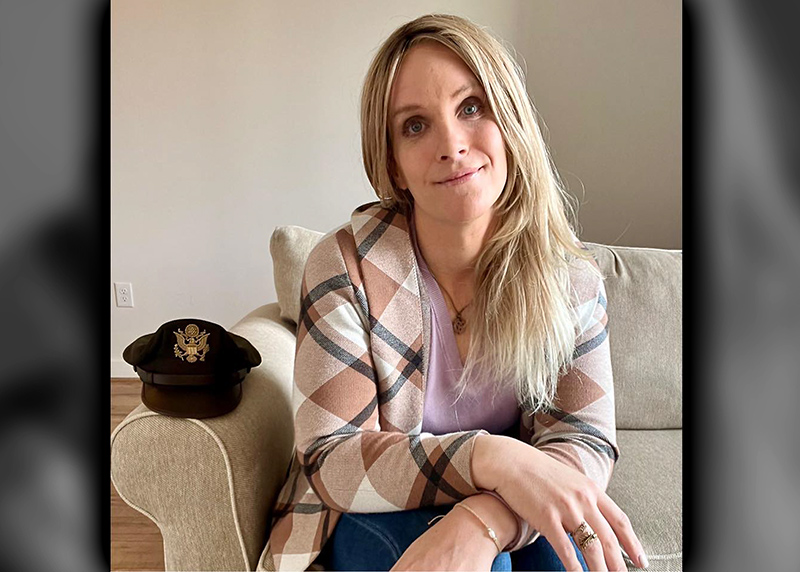WATCH: HRC launches “Reality Flag” ads
Ad campaign seeks to highlight anti-LGBTQ discrimination and galvanize public support for the Equality Act.
By John Riley on February 24, 2022 @JRileyMW

The Human Rights Campaign has launched a new digital campaign calling attention to various instances of anti-LGBTQ discrimination in the United States, in an effort to galvanize support for the Equality Act, which would enshrine various nondiscrimination protections for LGBTQ people into federal law.
The campaign, known as the “Reality Flag” campaign, employs the visual image of an American flag bearing only 21 white stars on the blue background, with just a blue background where the other 29 stars would fall. The flag represents the 21 states where LGBTQ people enjoy legal protections from discrimination, and the 29 states where LGBTQ people can legally be discriminated against in housing, credit, government services, and public accommodations.
The campaign can be seen online at RealityFlag.com and has been shared across several social media platforms. To mark the start of the campaign, an 85-foot-long banner featuring the “Reality Flag” was unfurled across the front of the Human Rights Campaign’s headquarters in Washington, D.C. HRC also partnered with Joey Soloway, the Emmy Award-winning director, producer and creator of Amazon’s Transparent, as well as a primarily LGBTQ production crew, to create a series of powerful video ads showcasing the stories and lived experiences of LGBTQ+ people who have been negatively impacted by discrimination.
The video vignettes will be amplified through an advertising campaign — utilizing various platforms including TV, print, video, and social media — and an influencer activation campaign, which will partner with major national influencers who will amplify content and share videos with their followers to promote the campaign, and, in turn, the Equality Act.
The aim of the vignettes is to connect with viewers and encourage them to lobby their senators to approve the Equality Act, which passed the U.S. House of Representatives last year, but has failed to receive a vote in the upper chamber due to the 60-vote threshold needed to overcome a silent filibuster and advance the legislation.
“When I was approached about partnering with HRC on this campaign, I jumped at the opportunity and immediately signed on — not only because of the important opportunity to help lift up stories and amplify the voices of LGBTQ+ people across the country, but because I believe this campaign has the potential to fundamentally shift the conversation around equality in a way that brings more people together than ever before to ensure we are all equally protected and represented under the law,” Soloway said in a statement.
“The Reality Flag campaign is designed to point out the inequalities LGBTQ+ individuals face every day — in our own voice,” Joni Madison, the Interim President at the Human Rights Campaign, said in a statement. “From housing and educational discrimination to denial of government and health services, LGBTQ+ people are confronted by hurdles to simply exist every day.
“Something is seriously wrong when state legislatures around the country are attacking LGBTQ+ rights for political purposes, forcing families to pack up their homes and move to another state so their children can have equal rights and legal protections. This needs to change,” Madison added. “The Reality Flag not only calls out the 29 states where basic freedoms are still missing for millions of people, but stands as a symbol of hope that communities can rally behind to enact meaningful change.”
Nearly two-thirds of LGBTQ+ Americans have reported experiencing discrimination in their personal lives, according to past polling from HRC. The Equality Act would seek to remedy that discrimination, to ensure that LGBTQ people are not being denied opportunities due to their sexual orientation or gender identity that would be made available to their heterosexual counterparts.
“The ‘Reality Flag’ was designed to build awareness of the missing freedoms that LGBTQ people have in this country,” JoDee Winterhof, HRC’s senior vice president of policy and political affairs, told Metro Weekly..
“There is currently a patchwork of protections across the country,” said Winterhof. “I think the stories that are in this campaign, from folks that have faced discrimination, are very powerful stories as well. And so I think the combination of visualizing that we do not have all the protections that other people in this country have, in all the states in this country, really does help get a point across.”
Winterhof said that the campaign’s aim of sharing real-life stories is intended to create a connection with viewers who may be unaware that such discrimination continues to persist, and, in so doing change hearts and minds about the importance of protections for the LGBTQ community.
“This is not a philosophical idea,” she said. “This is people trying to live their day-to-day lives and access their doctors and health care, rent a house, get a loan, or whatever it might be. I do think bringing to life and sharing more of these stories is very important because there isn’t consistent knowledge across the country that LGBTQ people face discrimination and that we don’t have full legal protections in this country.”
Queen Hatcher-Johnson, an LGBTQ advocate of trans experience who works as the gender-inclusive program manager at Positive Impact Health Centers in Atlanta, is one of the LGBTQ Americans sharing their stories as part of the campaign. Queen was renting a ranch-style, three-bedroom house in Lexington, North Carolina, a few years ago, when the landlord came to do repairs on the home. While there, he spotted a Pride flag, an HRC equality sticker, and a transgender flag and questioned Queen about what the transgender flag meant. After Queen explained the meaning to him, he went into a rant about how the flag’s significance went against his religious beliefs and berated Queen for “not living according to traditional American values.” Shortly after the incident, he demanded that Queen move out.
“I got a call from him and he said, ‘I need you to remove yourself from my property. I’m going to sell it,'” Queen said. “I later found out he did not sell the home. He actually rented the property again. I found out because my girlfriend, who is also a woman of trans experience, went to inquire about the property and he tried to rent it to her because he did not know she was trans.”
Unfortunately, due to the turmoil in Queen’s personal life, Queen’s performance at work began to suffer and Queen became unemployed. Queen was forced to couch-surf on friends’ couches, traveling from state to state until finally settling in Atlanta. But upon arriving in Atlanta and holing up at a rooming house, Queen wound up again facing discrimination after the homeowner accused Queen of being “disruptive,” claiming that other house residents were uncomfortable using the bathroom and kitchen facilities after Queen used them.
Queen eventually moved out, and after saving up enough money, became a homeowner. But Queen is still affected by the past encounters with housing discrimination — as well as other forms of harassment, including discrimination in medical services and public accommodations due to Queen’s gender identity.
“The sad part about the whole experience is it was all legal,” Queen said. “There was no recourse. There were no protections against housing discrimination extended to people of trans experience.”
“I want this campaign to raise awareness of the missing freedoms that we in the LGBTQ+ community do not have, and the need for comprehensive, comprehensive and consistent protection,” Queen said. “I’m hoping that this will create other advocates to come forth and share their stories of discrimination and that ultimately, because we live in a transactional society, that somebody who has some sort of financial backing, they will attach their name, their dollar, whatever they can do, to help change the hearts and the minds of the people in power, so we can just live our lives with the American freedoms that cis-identified people have benefited from for decades.”

Another person featured in the video is Staci Jenkins, a lesbian Naval veteran from Chesterton, Indiana, who previously lived in the Minneapolis metropolitan area, who was denied health care in 2015 after the neurologist to whom she had been referred by her primary doctor — in order to deal with sharp, stabbing pains all over her head and scalp, along with stiffness and soreness in her neck — refused to treat her or even touch her with gloves on because of her sexual orientation.
“I was in constant pain for three or four months, and couldn’t get relief,” Jenkins told Metro Weekly, referring to how her pain intensified in the months after the doctor refused to examine her. “It affected me at work, and I began to get negative performance reviews. I was trying to explain how I was in pain and they wanted to understand why I wasn’t getting relief. And I didn’t know where to go. … My job performance was sliding, my whole life was sliding. My relationship with my wife was sliding because when you’re in pain, you know, you tend to snap at the people that you hold closest.”
Although Jenkins was eventually referred to another specialist and diagnosed with occipital neuralgia, for which she was prescribed injections and lidocaine to help alleviate her symptoms, she still is upset at the idea she had to remain in pain, without any relief, for another two-and-a-half months before she could see a doctor who would treat her.
“I honestly feel that if the doctor who wouldn’t treat me would have simply touched the back of my head, she would have known immediately what was going on,” said Jenkins.
Unfortunately for Jenkins, that was not the first time she had encountered discrimination in medical care in Minnesota. Six years before the 2015 incident, her youngest daughter became very sick, with severe abdominal cramping, and couldn’t stop vomiting. Jenkins and her wife took their daughter to Minneapolis Children’s Hospital seeking help, but the medications prescribed by the doctors seemed to have no effect. But when staff found out that Jenkins and her wife were a lesbian couple, she claims the ER doctors at the hospital began to believe her daughter’s condition was psychological.
“They actually stopped testing for a day or two, had a psychologist come in and talk to her, and a psychiatrist, and then a social worker coming in to talk to her, told her how to use essential oil to calm herself. And yet she continued to vomit. She was flushed and had a fever and all these other symptoms that just didn’t go away,” Jenkins said. “So they started doing some tests, and she explained to them that having two moms is pretty good. She tried to tell them, ‘There’s nothing to worry about at my moms’ house. I’m not stressed, I’m sick.’
“So once they got over the fact that she had two moms, and began doing tests again, they realized that her gallbladder didn’t work. And so they ended up taking it out. But she missed a lot of school. She was in the hospital twice, for five days each time. So about a week each time because they did not listen to us when we were telling them that something was wrong with her,” Jenkins added. “So they figured it out eventually, but they really blew it off at first as ‘This is a kid with two moms who’s not dealing with it well.'”
Jenkins said that some people need to learn how to empathize on a human level with LGBTQ people.
“If people could understand that ‘What if it was their kid that went into the hospital?’ Imagine their child didn’t get health care because their dad was overweight and they get a kid with a stomachache, and they just assumed, ‘Well, you know what? They don’t eat very healthy.’ Honest to God, that could be the same reason,” she explained. So, ‘this kid’s got a stomach ache because they just eat fried stuff because look at the father.’ Or a doctor could pick up on friction between a mom and a dad and say, ‘Wow, you know? That kid’s got stress. That’s why they have the stomach ache.’ And it wouldn’t solve the problem. People need to look at this and say, ‘This could be my family.'”
As a veteran, Jenkins said she knows that some of her fellow veterans may criticize the campaign as “disrespectful” for not flying the full American flag with all 50 stars, and she’s ready for the criticism.
“I would just say that, in 29 states, even veterans don’t have some of these freedoms,” Jenkins said of how she’d respond. “To be discriminated against and not have the same freedoms as others just makes me angry, really flummoxed.”
That said, taking the photos and filming the commercial was an emotional trial for her, personally.
“I had a really hard time on the day we filmed. I was so emotional that day because of that flag. That tore at my heart,” she said. “So I had to reach down really deep to finish it. I had to think about everything I’ve gone through and my daughter went through. And that’s why I did it, because we don’t have those freedoms. I look at that flag, and it just makes me so sad. But it’s real, and that’s why it’s called the ‘Reality Flag.'”
Watch one of the “Reality Flag” campaign commercials below.
Editor’s note: An earlier version of this story incorrectly identified the person in a mask photographed helping Staci Jenkins hold up the ‘Reality Flag.’
Transgender Blackhawk Pilot Sues Right-Wing Influencer
Virginia Army National Guard pilot Jo Ellis is suing Matthew Wallace for spreading misinformation about her for "clicks and money."
By John Riley on April 13, 2025 @JRileyMW
Jo Ellis, a transgender pilot in the Virginia Army National Guard, is suing a right-wing influencer Matthew Wallace for claiming she was flying the Black Hawk helicopter that collided with an American Airlines plane, causing a fatal crash that claimed the lives of all 67 people inside both aircraft.
Ellis claims Wallace, who has 2.3 million followers on X, exploited the January 29 tragedy for "clicks and money" and accuses Wallace of deliberately spreading information he knew to be false.
The lawsuit was filed in U.S. District Court for the District of Colorado.
Cincinnati Pride Cuts Ties With Several Corporate Sponsors
The LGBTQ organization wants to partner only with corporations that demonstrate regular support for the LGBTQ community and respect for DEI.
By John Riley on March 25, 2025 @JRileyMW
Cincinnati Pride announced it will cut ties with several corporate sponsors, sacrificing tens of thousands of dollars, in response to the companies' decisions to eliminate diversity, equity, and inclusion (DEI) policies and initiatives.
The organization acknowledged that it would be a struggle to replace the funding for its annual Pride parade. But it has also said it is essential to stand by its values, which include respect for the history and diverse culture of the LGBTQ community.
Cincinnati Pride says it doesn't want to work with corporate sponsors that are viewed as hostile to those values and would rather work with companies that have demonstrated a genuine, ongoing commitment to LGBTQ causes throughout the calendar year, according to Cincinnati NBC affiliate WLWT.
Trump Administration May Close CDC’s HIV Prevention Division
HIV prevention advocates worry about the possible effects of defunding federal HIV prevention programs.
By John Riley on March 22, 2025 @JRileyMW
The Trump administration is considering a plan to eliminate the Centers for Disease Control and Prevention's (CDC) Division of HIV Prevention.
The CDC provides approximately $1 billion per year on domestic HIV prevention, funneling funds to states and territories, who then distribute it to local health departments and organizations.
The money primarily goes toward testing efforts to detect and respond to HIV outbreaks, carrying out campaigns to educate the public about the disease, and to encourage the adoption of prevention methods, including condoms and the use of pre-exposure prophylaxis (PrEP) to reduce chances of transmission.
Support Metro Weekly’s Journalism
These are challenging times for news organizations. And yet it’s crucial we stay active and provide vital resources and information to both our local readers and the world. So won’t you please take a moment and consider supporting Metro Weekly with a membership? For as little as $5 a month, you can help ensure Metro Weekly magazine and MetroWeekly.com remain free, viable resources as we provide the best, most diverse, culturally-resonant LGBTQ coverage in both the D.C. region and around the world. Memberships come with exclusive perks and discounts, your own personal digital delivery of each week’s magazine (and an archive), access to our Member's Lounge when it launches this fall, and exclusive members-only items like Metro Weekly Membership Mugs and Tote Bags! Check out all our membership levels here and please join us today!
The Magazine
-
Most Popular
 "Senate Twink" Says Video Sex Scandal Drove Him to Flee U.S.
"Senate Twink" Says Video Sex Scandal Drove Him to Flee U.S.  Abigail Spanberger Backed by HRC in Virginia Governor Bid
Abigail Spanberger Backed by HRC in Virginia Governor Bid  Gay Army Reserve Officer in Uniform Sex Video Scandal
Gay Army Reserve Officer in Uniform Sex Video Scandal  Nick Cave: The Wizard of Art
Nick Cave: The Wizard of Art  'Boop! The Musical' Is Broadway’s Happiest Surprise
'Boop! The Musical' Is Broadway’s Happiest Surprise  'Porn Star University' Started by Gay-for-Pay Creator Andy Lee
'Porn Star University' Started by Gay-for-Pay Creator Andy Lee  Lesbian Firefighter Awarded $1.75 Million in Lawsuit
Lesbian Firefighter Awarded $1.75 Million in Lawsuit  Trans Women Not Legally 'Women,' UK Supreme Court Rules
Trans Women Not Legally 'Women,' UK Supreme Court Rules  Sarah Snook is Astonishing in Broadway's 'Dorian Gray'
Sarah Snook is Astonishing in Broadway's 'Dorian Gray'  Signature Honors Mandy Patinkin in Emotional Celebration
Signature Honors Mandy Patinkin in Emotional Celebration
 "Senate Twink" Says Video Sex Scandal Drove Him to Flee U.S.
"Senate Twink" Says Video Sex Scandal Drove Him to Flee U.S.  Abigail Spanberger Backed by HRC in Virginia Governor Bid
Abigail Spanberger Backed by HRC in Virginia Governor Bid  Lesbian Firefighter Awarded $1.75 Million in Lawsuit
Lesbian Firefighter Awarded $1.75 Million in Lawsuit  Nick Cave: The Wizard of Art
Nick Cave: The Wizard of Art  Trans Women Not Legally 'Women,' UK Supreme Court Rules
Trans Women Not Legally 'Women,' UK Supreme Court Rules  Chef’s Best Is A Culinary Extravaganza For A Cause
Chef’s Best Is A Culinary Extravaganza For A Cause  This Week's Advertisers: Nick Cave - April 17, 2025
This Week's Advertisers: Nick Cave - April 17, 2025  Off-Broadway's 'All the World’s A Stage' Is Tender, Timely, and True
Off-Broadway's 'All the World’s A Stage' Is Tender, Timely, and True  'Boop! The Musical' Is Broadway’s Happiest Surprise
'Boop! The Musical' Is Broadway’s Happiest Surprise  Naples Pride Sues City Over Drag Show Ban
Naples Pride Sues City Over Drag Show Ban
Scene
Metro Weekly
Washington's LGBTQ Magazine
P.O. Box 11559
Washington, DC 20008 (202) 638-6830
About Us pageFollow Us:
· Facebook
· Twitter
· Flipboard
· YouTube
· Instagram
· RSS News | RSS SceneArchives
Copyright ©2024 Jansi LLC.











You must be logged in to post a comment.